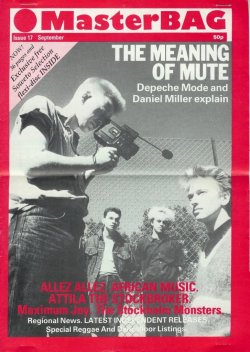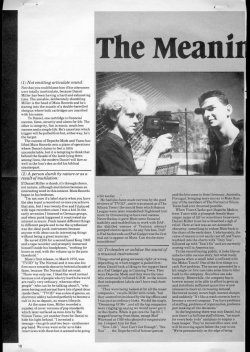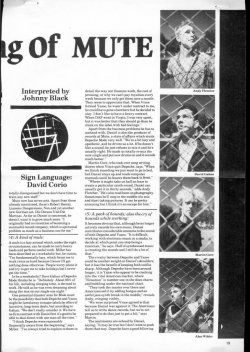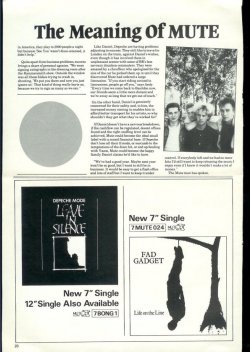The Meaning Of Mute
[Masterbag, September 1982. Words: Johnny Black. Pictures: David Corio.]
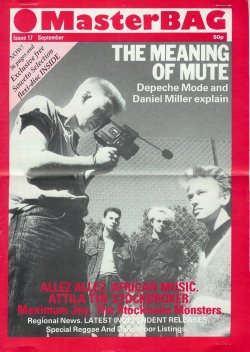
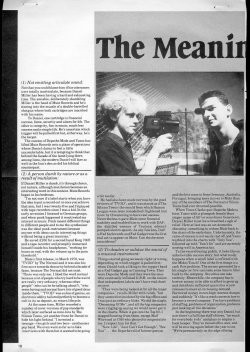
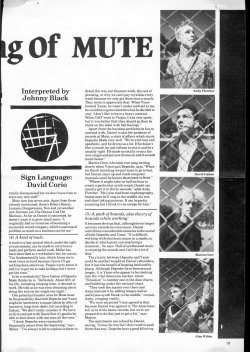
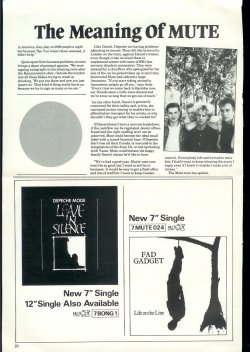
THE MEANING OF MUTE
(1) Not emitting articulate sound:
Not that you could blame him if his utterances were totally inarticulate, because Daniel Miller has been having a hard and exhausting time. The amiable, deliberately shambling Miller is the head of Mute Records and he’s staring into the muzzle of a double-barrelled shotgun where both cartridges are inscribed with his name.
To Daniel, one cartridge is financial success, fame, security, and ulcers for life. The other is integrity, fun in music, much less success and a simple life. He’s uncertain which trigger will be pulled first but, either way, he’s the target.
The success of Depeche Mode and Yazoo has lifted Mute Records onto a plane of operations where Daniel claims to feel a little uncomfortable, but it is tempting to think that behind the façade of the lamb lying down amongst the lions, the modern Daniel will fare as well in the lion’s den as did his biblical counterpart.
(2) A person dumb by nature or as a result of mutilation:
If Daniel Miller is dumb, it’s through choice, not nature, although mutilation becomes an interesting word in this context. Mute Records began in his bedroom.
“I’m not sure if a label starts when you have the idea to put out a record or once you achieve that aim, but I was twenty-five and I’d played with tape recorders since I was a kid. In the early seventies I listened to German groups, and when punk happened it reactivated my interest in music. Punk meant different things to different people and to me the synthesizer was the ideal punk instrument because anyone with ideas can do interesting things without being a great musician.”
He saved £250 for a second hand Korg 700S and a tape recorder and promptly immersed himself inside his headphones, “working for hours on end, with the volume up to the paint threshold.”
Mute’s first release, in March 1978, was “TVOD” by The Normal and it was also his first move towards obscurity behind a façade of fame, because The Normal did not exist. “There was only me. I liked the word normal because a lot of people who try hard to be weird are really very ordinary, whereas other people” (who can he be talking about?) “who seem boring and normal have lots of good ideas inside of them.” “TVOD” was a slice of genius, an electronic oddity tailored perfectly to become a cult in its no deposit, no return life cycle.
At the same time, Miller recorded a number of cover versions of pop standards which later surfaced as mini-hits by the Silicon Teens, yet another front for Daniel to hide his light behind. “I invented a teenage – two girls and two boys – synthesizer pop band. We even went so far as to fake interviews with them but it seemed to be going a bit too far…”
He had also been made nervous by the good review of “TVOD”, and it was almost as if The Silicon Teens (the mould from which Human League were later remodelled) frightened him more by threatening to have real success. Nevertheless it gave Mute some financial stability and enabled him to work with DAF, the distilled essence of Teutonic adrenal-pumped electro-spasm. As any fool knows, DAF is Fad backwards and Fad Gadget was the first real act to appear on Mute. Can this be mere coincidence?
(3) To deaden or subdue the sound of a musical instrument.
Things started going seriously right (or wrong, depending on which trigger is pulled first) when Daniel took a liking to the support band at a Fad Gadget gig in Canning Town. They were Depeche Mode and they were the ones who eventually inflicted G.B.H. on the notion that independent labels can’t have real chart success.
“They were being looked at by all the major companies,” recalls Miller with relish, “but they seemed intimidated by the big offices and I was just an ordinary bloke. We did the single, “Dreaming Of Me”, and all the big companies were ringing up saying we would never get it into the charts. When it got into the Top 60, I stopped hearing from them, except Muff Winwood at CBS, who phoned to congratulate me. I respect him for that.”
“New Life”, “Just Can’t Get Enough”, “See You”… the Depeche roll of honour goes on and the hits come in from Germany, Australia, Portugal, bringing more money to Mute than any of the members of The Normal or Silicon Teens had ever dreamed possible.
When Vince Clarke quit Depeche Mode to form Yazoo with a plumpish female blues singer name of Alf (or sometimes Genevieve) Daniel Miller must have breathed a sigh of relief. Here at last was an act doomed to obscurity, something to reduce Mute back to the chaos of the early days. Unfortunately, the curse of success is not easily cast off, and Yazoo warbled into the charts with “Only You”, followed up with “Don’t Go” and are currently scoring well in America too.
To the record buying public it looks like an unbelievable success story, but what really happens when a small label is inflicted with the Midas Touch? One of the first things is a cash flow problem. The money generated by a hit single (or five) can take some time to filter back into the company. Royalties can take eternity. Meanwhile, the company has to borrow money to be able to afford to press up and distribute sufficient quantities of new releases to meet an increasing demand. Borrowed money incurs high interest charges and suddenly “It’s like a crash course in how to become a record company. You have problems of staffing, problems of organization, problems just making all the decisions.”
In the beginning there was only Daniel, but now there’s a full time staff of three, “too much for everybody to do” and plans to employ a book keeper. They’ve moved office once, and will be moving again before the year is out. “We’re permanently on the edge of being totally disorganised but we don’t have time to train any new staff.”
Mute now has seven acts. Apart from those already mentioned there’s Robert Rental, Liaisons Dangereuses, Non and yet another new German act, Die Doraus Und Die Marinas. As far as Daniel is concerned, he doesn’t want to grow much more. “I originally had no intention of becoming a successful record company, which is a personal problem as much as a business one for me.”
[Masterbag, September 1982. Words: Johnny Black. Pictures: David Corio.]
A witty article on Daniel Miller and the early years of the Mute label. This article later appeared in Bong 14, with some very minor changes.




THE MEANING OF MUTE
(1) Not emitting articulate sound:
Not that you could blame him if his utterances were totally inarticulate, because Daniel Miller has been having a hard and exhausting time. The amiable, deliberately shambling Miller is the head of Mute Records and he’s staring into the muzzle of a double-barrelled shotgun where both cartridges are inscribed with his name.
To Daniel, one cartridge is financial success, fame, security, and ulcers for life. The other is integrity, fun in music, much less success and a simple life. He’s uncertain which trigger will be pulled first but, either way, he’s the target.
The success of Depeche Mode and Yazoo has lifted Mute Records onto a plane of operations where Daniel claims to feel a little uncomfortable, but it is tempting to think that behind the façade of the lamb lying down amongst the lions, the modern Daniel will fare as well in the lion’s den as did his biblical counterpart.
(2) A person dumb by nature or as a result of mutilation:
If Daniel Miller is dumb, it’s through choice, not nature, although mutilation becomes an interesting word in this context. Mute Records began in his bedroom.
“I’m not sure if a label starts when you have the idea to put out a record or once you achieve that aim, but I was twenty-five and I’d played with tape recorders since I was a kid. In the early seventies I listened to German groups, and when punk happened it reactivated my interest in music. Punk meant different things to different people and to me the synthesizer was the ideal punk instrument because anyone with ideas can do interesting things without being a great musician.”
He saved £250 for a second hand Korg 700S and a tape recorder and promptly immersed himself inside his headphones, “working for hours on end, with the volume up to the paint threshold.”
Mute’s first release, in March 1978, was “TVOD” by The Normal and it was also his first move towards obscurity behind a façade of fame, because The Normal did not exist. “There was only me. I liked the word normal because a lot of people who try hard to be weird are really very ordinary, whereas other people” (who can he be talking about?) “who seem boring and normal have lots of good ideas inside of them.” “TVOD” was a slice of genius, an electronic oddity tailored perfectly to become a cult in its no deposit, no return life cycle.
At the same time, Miller recorded a number of cover versions of pop standards which later surfaced as mini-hits by the Silicon Teens, yet another front for Daniel to hide his light behind. “I invented a teenage – two girls and two boys – synthesizer pop band. We even went so far as to fake interviews with them but it seemed to be going a bit too far…”
He had also been made nervous by the good review of “TVOD”, and it was almost as if The Silicon Teens (the mould from which Human League were later remodelled) frightened him more by threatening to have real success. Nevertheless it gave Mute some financial stability and enabled him to work with DAF, the distilled essence of Teutonic adrenal-pumped electro-spasm. As any fool knows, DAF is Fad backwards and Fad Gadget was the first real act to appear on Mute. Can this be mere coincidence?
(3) To deaden or subdue the sound of a musical instrument.
Things started going seriously right (or wrong, depending on which trigger is pulled first) when Daniel took a liking to the support band at a Fad Gadget gig in Canning Town. They were Depeche Mode and they were the ones who eventually inflicted G.B.H. on the notion that independent labels can’t have real chart success.
“They were being looked at by all the major companies,” recalls Miller with relish, “but they seemed intimidated by the big offices and I was just an ordinary bloke. We did the single, “Dreaming Of Me”, and all the big companies were ringing up saying we would never get it into the charts. When it got into the Top 60, I stopped hearing from them, except Muff Winwood at CBS, who phoned to congratulate me. I respect him for that.”
“New Life”, “Just Can’t Get Enough”, “See You”… the Depeche roll of honour goes on and the hits come in from Germany, Australia, Portugal, bringing more money to Mute than any of the members of The Normal or Silicon Teens had ever dreamed possible.
When Vince Clarke quit Depeche Mode to form Yazoo with a plumpish female blues singer name of Alf (or sometimes Genevieve) Daniel Miller must have breathed a sigh of relief. Here at last was an act doomed to obscurity, something to reduce Mute back to the chaos of the early days. Unfortunately, the curse of success is not easily cast off, and Yazoo warbled into the charts with “Only You”, followed up with “Don’t Go” and are currently scoring well in America too.
To the record buying public it looks like an unbelievable success story, but what really happens when a small label is inflicted with the Midas Touch? One of the first things is a cash flow problem. The money generated by a hit single (or five) can take some time to filter back into the company. Royalties can take eternity. Meanwhile, the company has to borrow money to be able to afford to press up and distribute sufficient quantities of new releases to meet an increasing demand. Borrowed money incurs high interest charges and suddenly “It’s like a crash course in how to become a record company. You have problems of staffing, problems of organization, problems just making all the decisions.”
In the beginning there was only Daniel, but now there’s a full time staff of three, “too much for everybody to do” and plans to employ a book keeper. They’ve moved office once, and will be moving again before the year is out. “We’re permanently on the edge of being totally disorganised but we don’t have time to train any new staff.”
Mute now has seven acts. Apart from those already mentioned there’s Robert Rental, Liaisons Dangereuses, Non and yet another new German act, Die Doraus Und Die Marinas. As far as Daniel is concerned, he doesn’t want to grow much more. “I originally had no intention of becoming a successful record company, which is a personal problem as much as a business one for me.”
Last edited:

